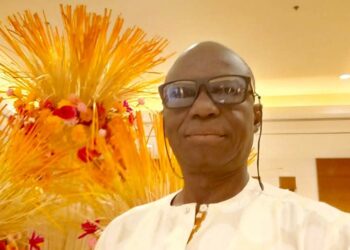The National Security Adviser, Mallam Nuhu Ribadu, has asked Nigerians to be patient with the Bola Tinubu administration, noting that the crises inherited from the previous government will not disappear overnight.
Ribadu said President Tinubu inherited serious active security challenges capable of bringing the country to its knees, citing the Boko Haram insurgency in the North-East, militancy and oil theft in the Niger Delta region, insecurity in the South-East and banditry in the North-West.
The NSA stated this on Thursday in Uyo, Akwa Ibom State, while speaking at the ongoing 19th Annual Nigerian Editors Conference.

The conference had the theme, ‘Stimulating economic growth, technological advancement, role of the media.’
The former Economic and Financial Crimes Commission chairman, however, pointed out that there had been a lot of improvement in the security challenges confronting the country and appealed to Nigerians to cooperate with the Federal Government in its effort to eliminate all forms of insecurity in the country.
Ribadu’s latest complaint about the administration of former president Muhammadu Buhari is coming a few days after he lamented that Tinubu’s government inherited a bankrupt country.
The NSA had told participants at the Chief of Defence Intelligence Annual Conference 2023 in Abuja on Monday that the revenue generated by the current administration was being used to repay “what was taken from the country.’’
Buhari govt and subsidy
It was earlier reported that the Buhari administration spent more than N10tn on subsidy for Premium Motor Spirit, popularly called petrol.
In June this year, The PUNCH reported that the previous administration borrowed N56.32tn between 2016 and 2022, a period of seven years.
On taking office in May, Tinubu ended the fuel subsidy regime and on August 1, the President in a nationwide broadcast, revealed that the Federal Government had saved N1tn in the two months (June and July) since the removal of the subsidy.
Ribadu in his presentation at Uyo, stated, “By June 1, 2023, when we took over the country we have serious active security challenges, serious ones Even one alone will undermine seriously management of the country.
“We have Boko Haram which is 15 years now ongoing. Militancy in the Niger Delta has been on for many years, banditry and kidnapping, especially within northern Nigeria in the North-West.
“And unfortunately, that is still a little going on in the South-East. These four massive problems, each one is capable of bringing us to our own knees. All of them are very active. At the time we took over, like last year, we used to have a minimum of 1,200 or more violent deaths as a result of criminal activities.’’
Speaking further, the top official argued that the security situation had improved under the Tinubu administration, stressing that he was not condemning the previous administration but was simply stating the truth.
He noted, “We are all in this together, as a National Security Adviser, you want to hear about national security. We have been there about five months, a few days into office. We have given Nigeria to President Bola Tinubu to manage it for us.
“In the last five months, I have been there by his side and have seen how things were when we started and how things are now and hopefully the direction we are going is okay.
“We inherited a tough period. We appeal for patience and understanding. It’s tough times and that is the reality. We are not condemning anyone but that is the truth. Those who are in charge must say the truth, say it as it is, and then hopefully things will be better for you.
“Like I said, my coming (here) is to identify with you. I also appeal to you for support. We are going through tough times. It requires all of us to come together. We are all in it together. It is not going to be for too long. Is a matter of time, it will be better.’’
Trumpeting the ‘achievements’ of his principal, he added, “Let me start with the Niger Delta; at the time we took over, the production of crude oil was 1.1 million barrels per day. Today, crude oil production is over 1.7 mbd.
“We have witnessed three weeks without any incidence of security challenges in the Niger Delta. This is the first time since 1993, that we don’t talk.
“In the South-East, we had 46 police stations attacked. We had people who were not indigenous to the country attacked, and killed. Today, we don’t have a single one.
S’East killings
“In the last two months, not a single person has been killed through the violent attack in the South-East. We don’t talk. The leadership we have in our country understands things a bit better. Work more, talk less.”
Highlighting further the positive developments in the national security architecture, the NSA noted that the stay-at-home restrictions and the bloodshed in the South-East had ceased.
He affirmed that collective effort was required to tame the insecurity scarring the northern part of the country.
The NSA noted, “Don’t allow insecurity to be part of you for long, build your capacities, and security systems. We allowed insecurity to last for a good 15 years. In the North-East, people were not able to go to their farms or markets. These are ordinary people in the villages who have no money.
“The situation, especially in northern Nigeria, is challenging, with a rise in violent criminal activity. We need collective efforts to address this issue. The security forces and hospitals are dealing with life-altering tragedies. Education and health are hampered by these challenges.
“In the last month, no case of insecurity has been reported in the North-East, the same with banditry. Kidnappings have been on the rise, with victims facing prolonged detention. About 600 people were kidnapped, some of them kept for long in the North-West, and they have been released. While there’s progress, much work remains. We need to address these issues collectively.’’
He recalled the blood-curdling activities of terrorists who attacked the trains, prisons, and police stations.
“Today, I can tell you that you travel from Abuja to Kaduna. Yes, it’s happening,’’ he boasted, adding, “This is just one way of tackling insecurity. Kidnapping today has replaced armed robbery in Nigeria because people don’t carry money anymore. That is what is going on in the country.’’
The NSA observed that organised crimes had reduced considerably, adding that the mass abduction by criminal gangs had been tackled.
He assured that the Federal Government would continue to do everything possible to improve the welfare of its citizens and remain transparent in doing government business.
“This government is rather the most transparent government ever in the history of Nigeria. Honestly, we will be sincere and do our best. Sometimes, the issue of national security requires little management to get the result that you are looking for,” he added
In his reaction to the claims by the NSA that the Tinubu government inherited a bankrupt economy from the Buhari administration, the Labour Party candidate in the February 25 presidential election, Peter Obi, has challenged the Federal Government to disclose the liabilities his predecessor passed to him.
Ribadu had claimed that the revenue generated by the Tinubu-led administration was being used to repay what was taken from the country.
However, in a series of tweets via his profile on X, the former Anambra State governor challenged the government to disclose the deficit inherited from the previous All Progressives Congress administration to demonstrate its level of transparency and accountability.
Obi faulted the Buhari government for failing to disclose the deficit it claimed the preceding Goodluck Jonathan government passed to it in 2015.
The tweets read, “I just read yesterday, a widely publicised story from the present APC-led Federal Government saying that they inherited a bankrupt nation from their predecessor APC administration. But the story failed to disclose what they inherited which had qualified us for bankruptcy status.
“One major characteristic of responsible governance is transparency and strict accountability. This demands that the government disclose exactly the degree of deficit they inherited. What is inherited should be disclosed to enable the public to know where we are and where we are headed.”









